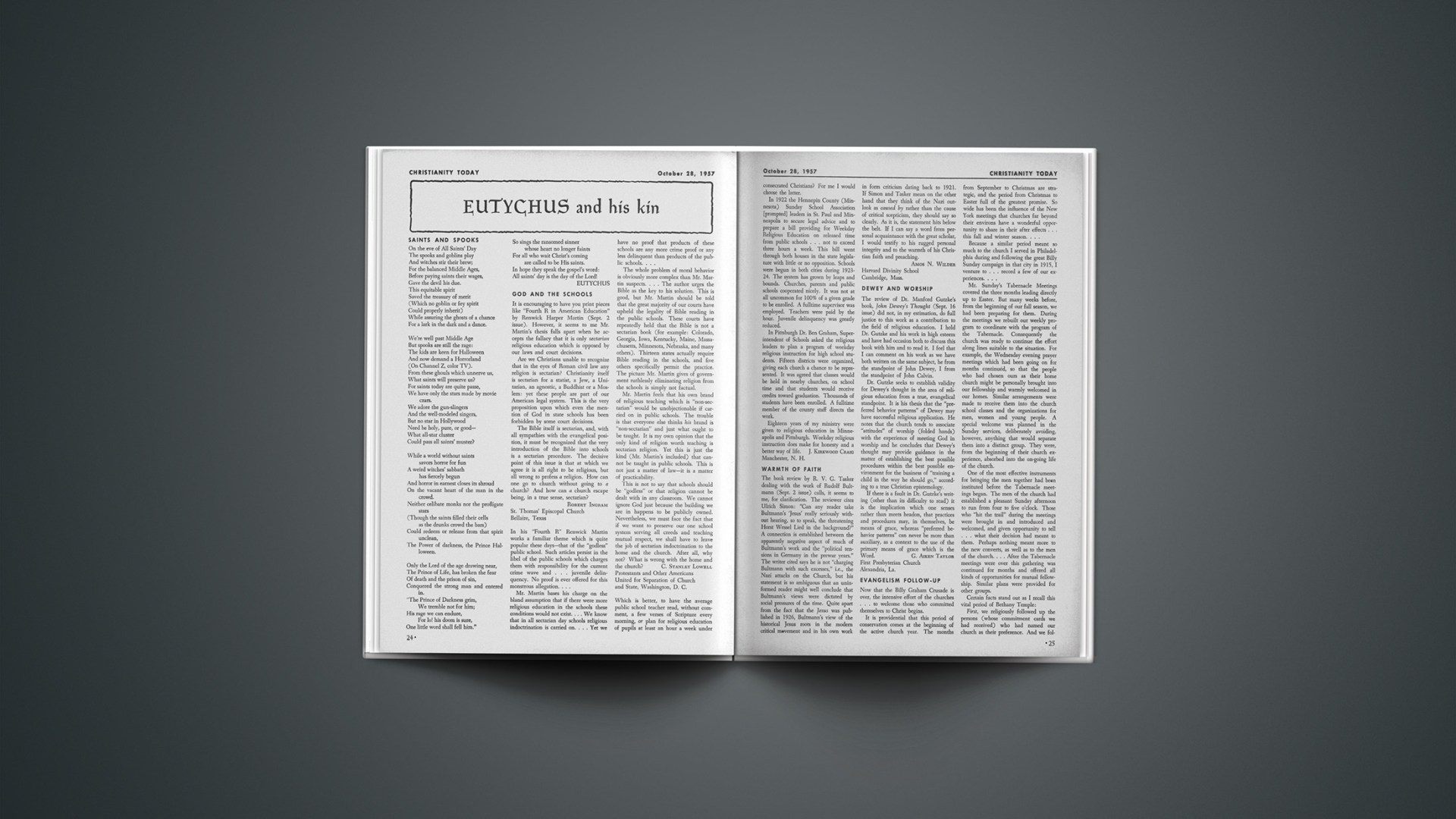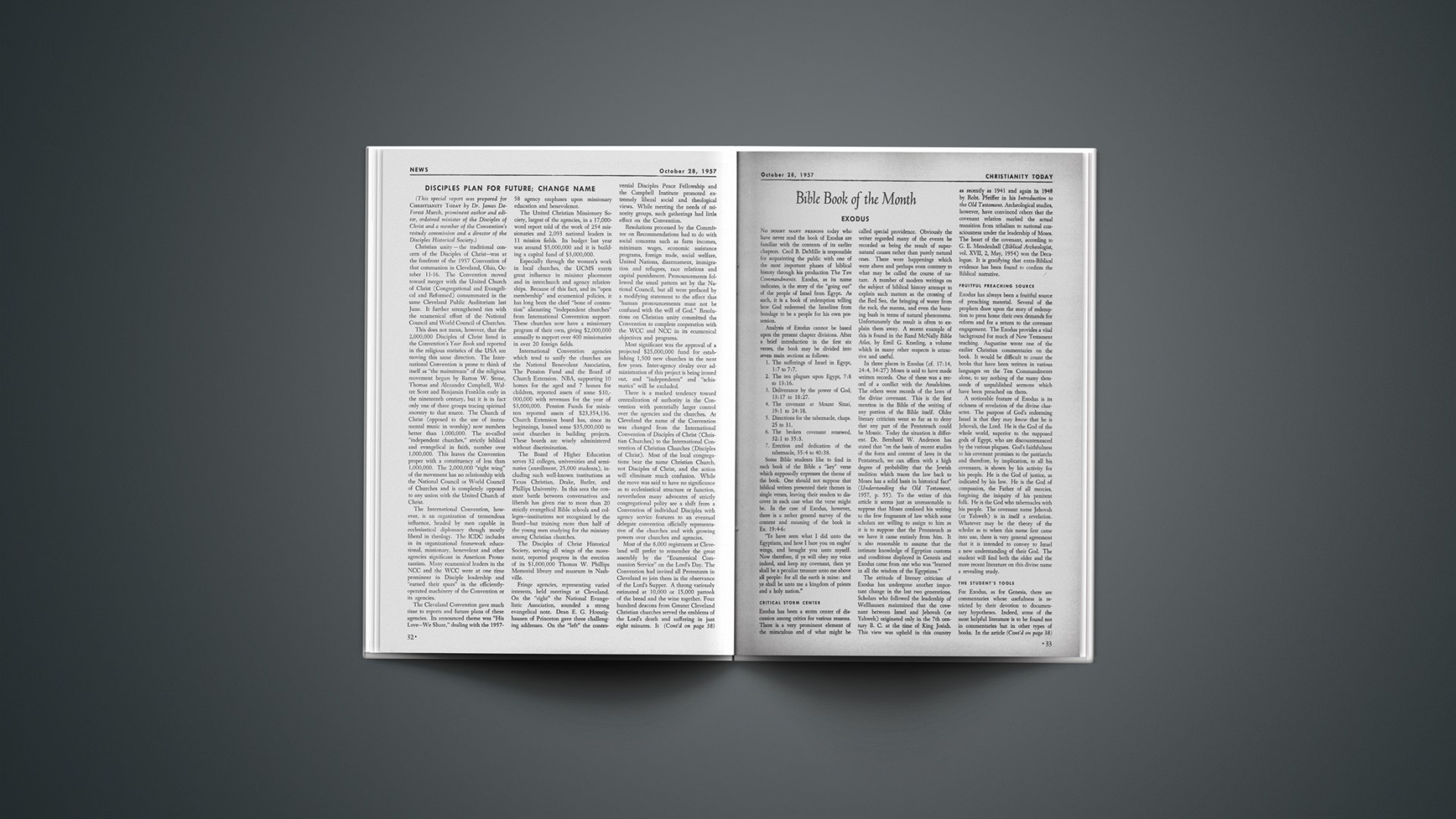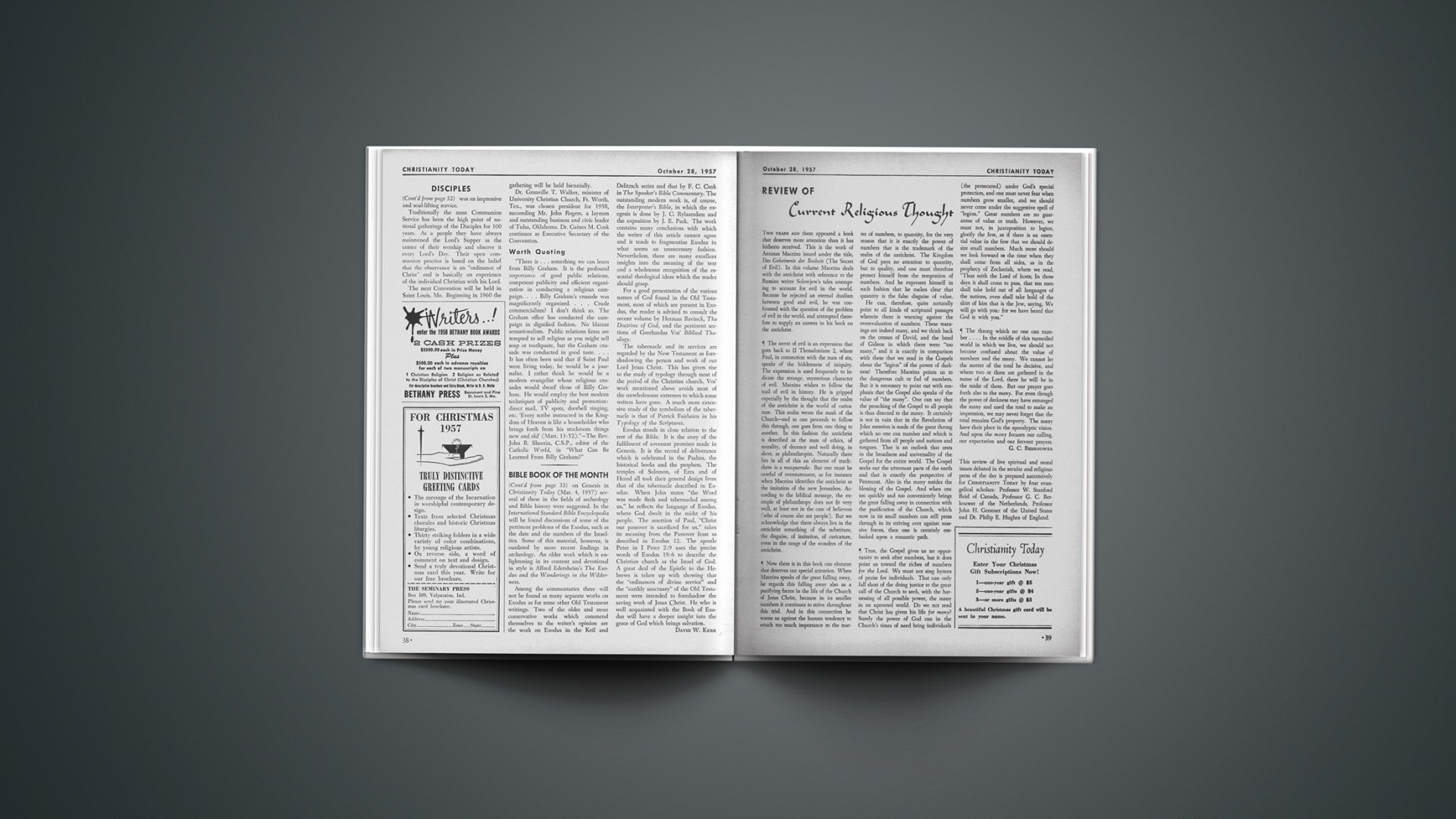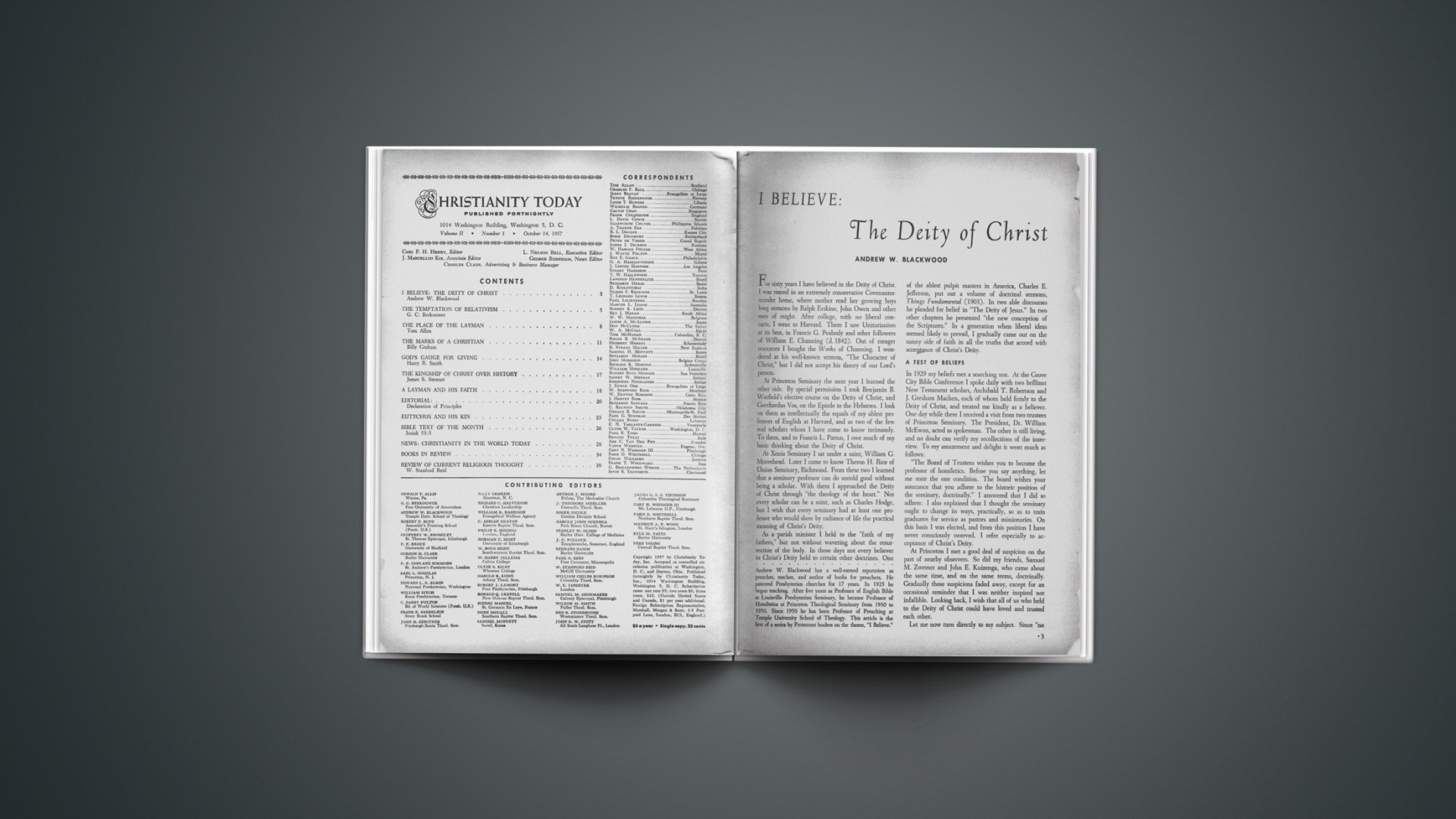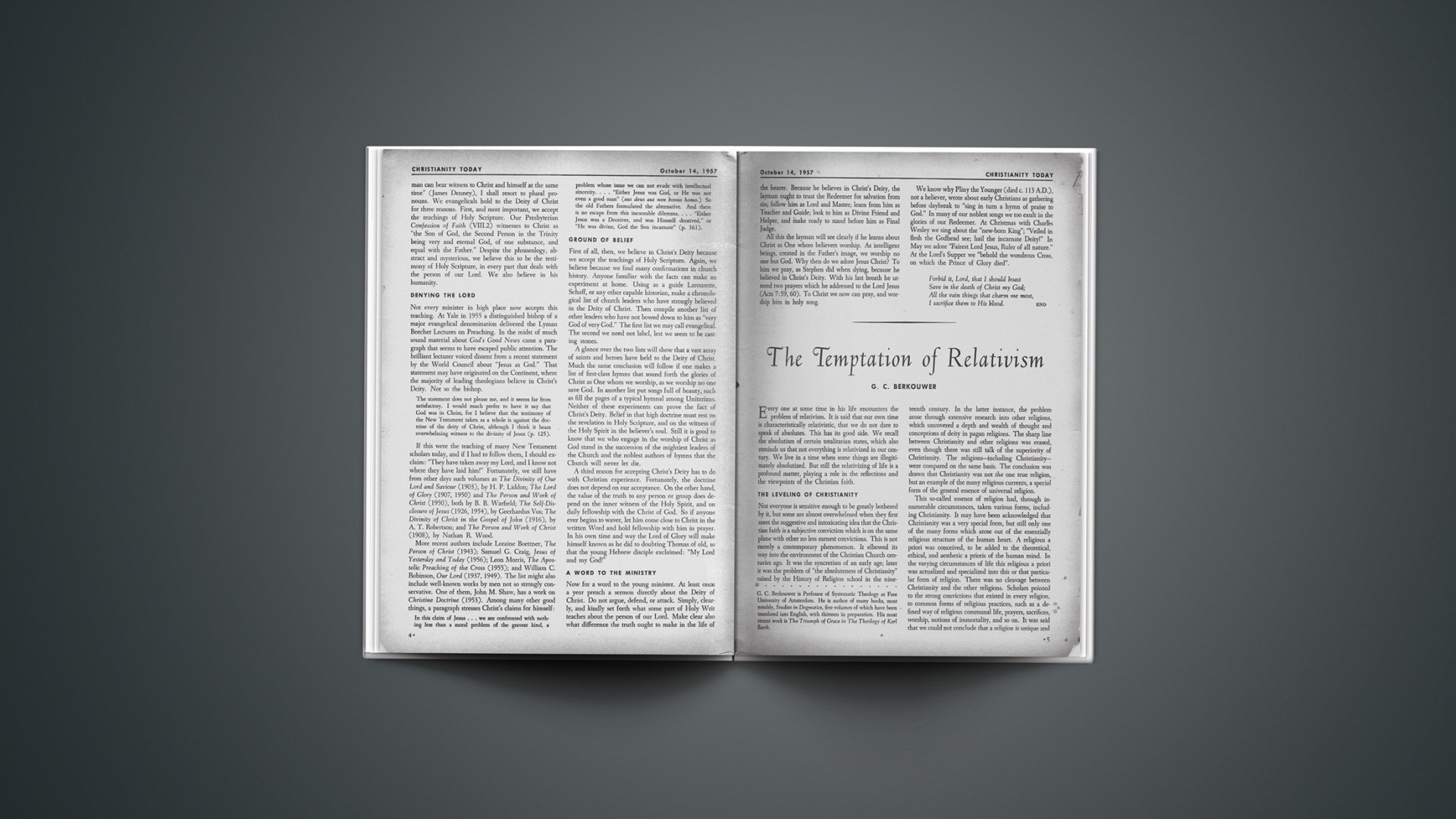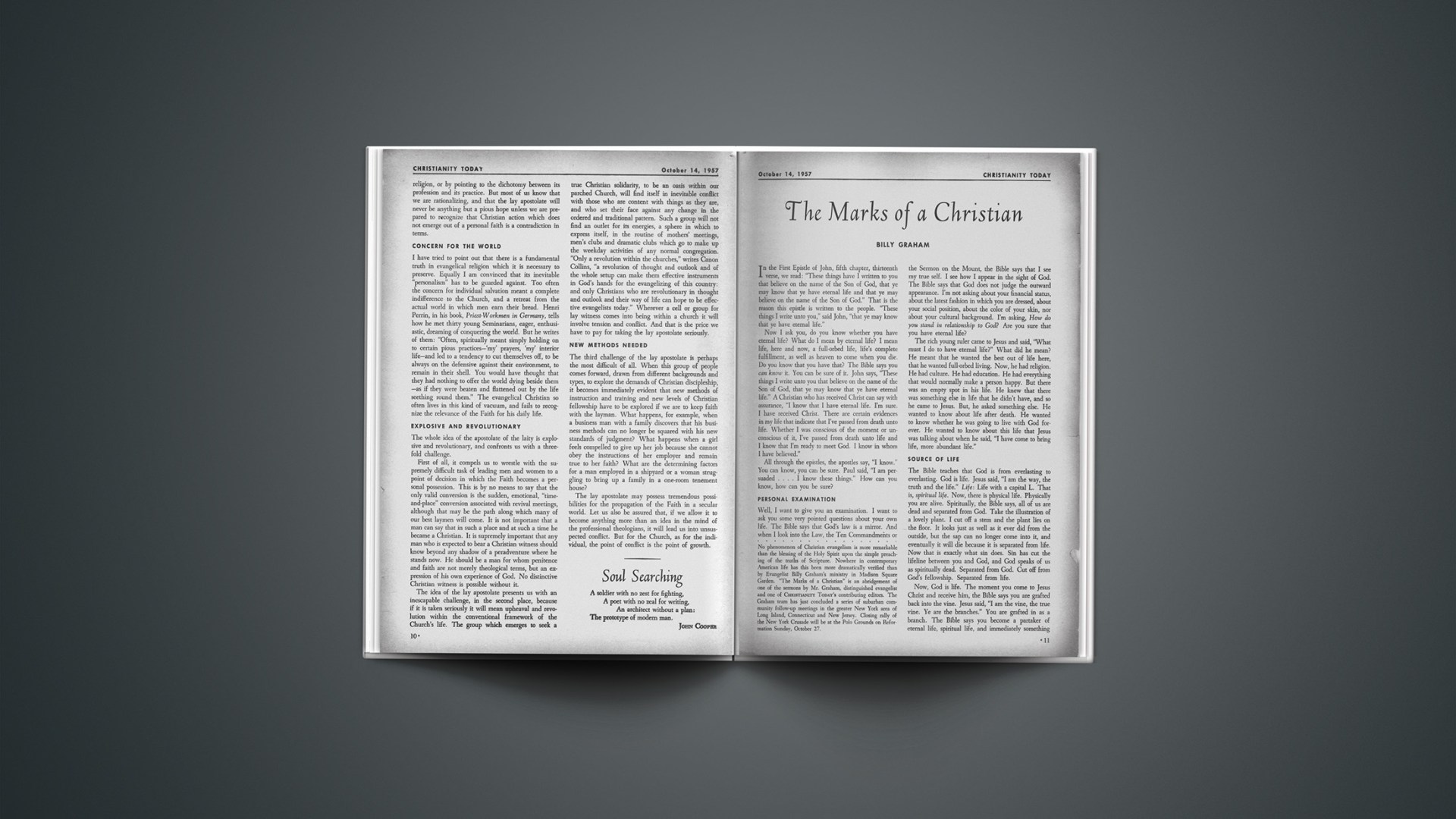SAINTS AND SPOOKS
On the eve of All Saints’ Day
The spooks and goblins play
And witches stir their brew;
For the balanced Middle Ages,
Before paying saints their wages,
Gave the devil his due.
This equitable spirit
Saved the treasury of merit
(Which no goblin or fey spirit
Could properly inherit)
While assuring the ghosts of a chance
For a lark in the dark and a dance.
We’re well past Middle Age
But spooks are still the rage:
The kids are keen for Halloween
And now demand a Horrorland
(On Channel Z, color TV).
From these ghouls which unnerve us,
What saints will preserve us?
For saints today are quite passe,
We have only the stars made by movie czars.
We adore the gun-slingers
And the well-modeled singers,
But no star in Hollywood
Need be holy, pure, or good—
What all-star cluster
Could pass all saints’ muster?
While a world without saints savors horror for fun
A weird witches’ sabbath has fiercely begun
And horror in earnest closes its shroud
On the vacant heart of the man in the crowd.
Neither celibate monks nor the profligate stars
(Though the saints filled their cells as the drunks crowd the bars)
Could redeem or release from that spirit unclean,
The Power of darkness, the Prince Halloween.
Only the Lord of the age drawing near,
The Prince of Life, has broken the fear
Of death and the prison of sin,
Conquered the strong man and entered in.
“The Prince of Darkness grim,
We tremble not for him;
His rage we can endure,
For lo! his doom is sure,
One little word shall fell him.”
So sings the ransomed sinner
whose heart no longer faints
For all who wait Christ’s coming
are called to be His saints.
In hope they speak the gospel’s word:
All saints’ day is the day of the Lord!
EUTYCHUS
GOD AND THE SCHOOLS
It is encouraging to have you print pieces like “Fourth R in American Education” by Renwick Harper Martin (Sept. 2 issue). However, it seems to me Mr. Martin’s thesis falls apart when he accepts the fallacy that it is only sectarian religious education which is opposed by our laws and court decisions.
Are we Christians unable to recognize that in the eyes of Roman civil law any religion is sectarian? Christianity itself is sectarian for a statist, a Jew, a Unitarian, an agnostic, a Buddhist or a Moslem: yet these people are part of our American legal system. This is the very proposition upon which even the mention of God in state schools has been forbidden by some court decisions.
The Bible itself is sectarian, and, with all sympathies with the evangelical position, it must be recognized that the very introduction of the Bible into schools is a sectarian procedure. The decisive point of this issue is that at which we agree it is all right to be religious, but all wrong to profess a religion. How can one go to church without going to a church? And how can a church escape being, in a true sense, sectarian?
St. Thomas’ Episcopal Church
Bellaire, Texas
In his “Fourth R” Renwick Martin works a familiar theme which is quite popular these days—that of the “godless” public school. Such articles persist in the libel of the public schools which charges them with responsibility for the current crime wave and … juvenile delinquency. No proof is ever offered for this monstrous allegation.…
Mr. Martin bases his charge on the bland assumption that if there were more religious education in the schools these conditions would not exist.… We know that in all sectarian day schools religious indoctrination is carried on.… Yet we have no proof that products of these schools are any more crime proof or any less delinquent than products of the public schools.…
The whole problem of moral behavior is obviously more complex than Mr. Martin suspects.… The author urges the Bible as the key to his solution. This is good, but Mr. Martin should be told that the great majority of our courts have upheld the legality of Bible reading in the public schools. These courts have repeatedly held that the Bible is not a sectarian book (for example: Colorado, Georgia, Iowa, Kentucky, Maine, Massachusetts, Minnesota, Nebraska, and many others). Thirteen states actually require Bible reading in the schools, and five others specifically permit the practice. The picture Mr. Martin gives of government ruthlessly eliminating religion from the schools is simply not factual.
Mr. Martin feels that his own brand of religious teaching which is “non-sectarian” would be unobjectionable if carried on in public schools. The trouble is that everyone else thinks his brand is “non-sectarian” and just what ought to be taught. It is my own opinion that the only kind of religion worth teaching is sectarian religion. Yet this is just the kind (Mr. Martin’s included) that cannot be taught in public schools. This is not just a matter of law—it is a matter of practicability.
This is not to say that schools should be “godless” or that religion cannot be dealt with in any classroom. We cannot ignore God just because the building we are in happens to be publicly owned. Nevertheless, we must face the fact that if we want to preserve our one school system serving all creeds and teaching mutual respect, we shall have to leave the job of sectarian indoctrination to the home and the church. After all, why not? What is wrong with the home and the church?
Protestants and Other Americans
United for Separation of Church
and State, Washington, D. C.
Which is better, to have the average public school teacher read, without comment, a few verses of Scripture every morning, or plan for religious education of pupils at least an hour a week under consecrated Christians? For me I would choose the latter.
In 1922 the Hennepin County (Minnesota) Sunday School Association [prompted] leaders in St. Paul and Minneapolis to secure legal advice and to prepare a bill providing for Weekday Religious Education on released time from public schools … not to exceed three hours a week. This bill went through both houses in the state legislature with little or no opposition. Schools were begun in both cities during 1923–24. The system has grown by leaps and bounds. Churches, parents and public schools cooperated nicely. It was not at all uncommon for 100% of a given grade to be enrolled. A fulltime supervisor was employed. Teachers were paid by the hour. Juvenile delinquency was greatly reduced.
In Pittsburgh Dr. Ben Graham, Superintendent of Schools asked the religious leaders to plan a program of weekday religious instruction for high school students. Fifteen districts were organized, giving each church a chance to be represented. It was agreed that classes would be held in nearby churches, on school time and that students would receive credits toward graduation. Thousands of students have been enrolled. A fulltime member of the county staff directs the work.
Eighteen years of my ministry were given to religious education in Minneapolis and Pittsburgh. Weekday religious instruction does make for honesty and a better way of life.
Manchester, N. H.
WARMTH OF FAITH
The book review by R. V. G. Tasker dealing with the work of Rudolf Bultmann (Sept. 2 issue) calls, it seems to me, for clarification. The reviewer cites Ulrich Simon: “Can any reader take Bultmann’s ‘Jesus’ really seriously without hearing, so to speak, the threatening Horst Wessel Lied in the background?” A connection is established between the apparently negative aspect of much of Bultmann’s work and the “political tensions in Germany in the prewar years.” The writer cited says he is not “charging Bultmann with such excesses,” i.e., the Nazi attacks on the Church, but his statement is so ambiguous that an uninformed reader might well conclude that Bultmann’s views were dictated by social pressures of the time. Quite apart from the fact that the Jesus was published in 1926, Bultmann’s view of the historical Jesus roots in the modern critical movement and in his own work in form criticism dating back to 1921. If Simon and Tasker mean on the other hand that they think of the Nazi outlook as caused by rather than the cause of critical scepticism, they should say so clearly. As it is, the statement hits below the belt. If I can say a word from personal acquaintance with the great scholar, I would testify to his rugged personal integrity and to the warmth of his Christian faith and preaching.
Harvard Divinity School
Cambridge, Mass.
DEWEY AND WORSHIP
The review of Dr. Manford Gutzke’s book, John Dewey’s Thought (Sept. 16 issue) did not, in my estimation, do full justice to this work as a contribution to the field of religious education. I hold Dr. Gutzke and his work in high esteem and have had occasion both to discuss this book with him and to read it. I feel that I can comment on his work as we have both written on the same subject, he from the standpoint of John Dewey, I from the standpoint of John Calvin.
Dr. Gutzke seeks to establish validity for Dewey’s thought in the area of religious education from a true, evangelical standpoint. It is his thesis that the “preferred behavior patterns” of Dewey may have successful religious application. He notes that the church tends to associate “attitudes” of worship (folded hands) with the experience of meeting God in worship and he concludes that Dewey’s thought may provide guidance in the matter of establishing the best possible procedures within the best possible environment for the business of “training a child in the way he should go,” according to a true Christian epistemology.
If there is a fault in Dr. Gutzke’s writing (other than its difficulty to read) it is the implication which one senses rather than meets headon, that practices and procedures may, in themselves, be means of grace, whereas “preferred behavior patterns” can never be more than auxiliary, as a context to the use of the primary means of grace which is the Word.
First Presbyterian Church
Alexandria, La.
EVANGELISM FOLLOW-UP
Now that the Billy Graham Crusade is over, the intensive effort of the churches … to welcome those who committed themselves to Christ begins.
It is providential that this period of conservation comes at the beginning of the active church year. The months from September to Christmas are strategic, and the period from Christmas to Easter full of the greatest promise. So wide has been the influence of the New York meetings that churches far beyond their environs have a wonderful opportunity to share in their after effects … this fall and winter season.…
Because a similar period meant so much to the church I served in Philadelphia during and following the great Billy Sunday campaign in that city in 1915, I venture to … record a few of our experiences.…
Mr. Sunday’s Tabernacle Meetings covered the three months leading directly up to Easter. But many weeks before, from the beginning of our fall season, we had been preparing for them. During the meetings we rebuilt our weekly program to coordinate with the program of the Tabernacle. Consequently the church was ready to continue the effort along lines suitable to the situation. For example, the Wednesday evening prayer meetings which had been going on for months continued, so that the people who had chosen ours as their home church might be personally brought into our fellowship and warmly welcomed in our homes. Similar arrangements were made to receive them into the church school classes and the organizations for men, women and young people. A special welcome was planned in the Sunday services, deliberately avoiding, however, anything that would separate them into a distinct group. They were, from the beginning of their church experience, absorbed into the on-going life of the church.
One of the most effective instruments for bringing the men together had been instituted before the Tabernacle meetings began. The men of the church had established a pleasant Sunday afternoon to run from four to five o’clock. Those who “hit the trail” during the meetings were brought in and introduced and welcomed, and given opportunity to tell … what their decision had meant to them. Perhaps nothing meant more to the new converts, as well as to the men of the church.… After the Tabernacle meetings were over this gathering was continued for months and offered all kinds of opportunities for mutual fellowship. Similar plans were provided for other groups.
Certain facts stand out as I recall this vital period of Bethany Temple:
First, we religiously followed up the persons (whose commitment cards we had received) who had named our church as their preference. And we followed them up at once, and continued to keep in touch with them until we reached them. Second, we gave them an invitation to become communicant members of the church as soon as they could attend the communicant classes through which all new members were instructed. Special classes were held for children. Third, we made some person or family responsible for introducing the new members to the older members in their own neighborhoods, and keeping in touch with them in a friendly yet unobtrusive fashion for a few months. Officers of the church were assigned especially to this task. Fourth, we had a group system in the church which brought the families together at stated times. The new members were quickly drawn into these friendly home groups and as soon as possible the meetings were held in their homes. Fifth, the officers of the church, church school and organizations all kept their eyes open for tasks to which these new members could be assigned and timed.
This program continued over the years with the result that within a few years the converts from the Billy Sunday meetings had been completely integrated into the life of the church.
Bethany Temple received the cards of 108 persons who “hit the sawdust trail,” not counting many of our own members who went forward to reconsecrate themselves to Christ. During the two years following the meetings we received into our membership, from the families of these 108, a total of 450 people including the trail-hitters themselves.
The question is being asked concerning the converts from the Billy Graham Crusade, “Will they continue?” The answer will depend partly on the persons themselves, but to a large extent on the way they are received and built into the churches they join. If the churches, inspired by their devotion to Christ and their dependence upon the Holy Spirit, will faithfully seek to build these folks into a living church, they will stand.
I remained long enough at Bethany Temple to see the church do this very thing. When I left, at least a third of the teachers and officers of the church school and a goodly proportion of the active workers in our organizations, and many of the officers of the church, had been drawn from the ranks of those that came to us directly or indirectly through the Billy Sunday meetings. I can say truthfully that no event in the 14 years of my ministry in Philadelphia had such a vitalizing influence on the church as a whole as the Billy Sunday meetings and their aftermath through the years.
I must add a postscript. Two years after the Billy Sunday campaign I happened to be in the study of another minister, of a church not unlike our own in personnel and neighborhood. As the minister and I chatted together he caught me looking around at his bookcases. Atop one was a bunch of cards which he thought had caught my eye. He said, “I see you are looking at these cards; do you know what they are?” I said I had no idea. “Well,” he said, “those are the cards I received from the Billy Sunday meetings.” “What did you do with them?” I asked. “Do?” he replied; “why nothing.” I said, “Do you mean to say that you never followed them up?” “Certainly not,” he answered. “Such cards mean nothing, we never received a member into our church from that much publicized campaign.”
My heart ached for that man, and it does now. Of all the lost opportunities that I can personally remember over a lifetime in the ministry, that is still to me the most tragic. If you are a minister and have been in any way moved by the Billy Graham meetings, do not fail yourself, your church, these new converts and your Redeeming Lord.
Asheville, N. C.
• Dr. Ferry, now retired, was for many years pastor of the Bethany Temple Presbyterian Church in Philadelphia.—ED.
A YEAR’S READING
The only irritant and discordant note I have detected in your otherwise outstanding and commendable articles during a full year’s reading was sounded in your recent articles on RSV, which somehow did not satisfy, being negatively critical in part, and “damning with faint praise” in part. As a member of a conservative church-body’s committee, which for five or six years has critically studied the RSV, making careful comparisons with the original texts, I have come to George Eldon Ladd’s conclusions, viz. “Criticism, if any, must be directed to the revisers’ judgment, not to their theological presuppositions,” and “The charges have repeatedly been made that RSV reflects a liberal theological tendency and that the translators have misrepresented the original text in favor of lower theological positions. A critical study of RSV does not bear this out.” If the RSV is not perfect, it is, as Dr. Ladd declares at the close of his evaluation of the RSV NT (CT, July 8, p. 11), “the most useful translation we possess.” Then why, I wonder, has the good doctor “no zeal, in principle, to defend the RSV per se”? If the RSV is “the most useful translation we possess,” why not all help perfect it by sending valid criticisms with supporting evidence to the RSV Translators’ Committee for consideration, as my church through its committee plans to do? Valid criticisms and helpful suggestions are most welcome, I am sure. Unjustified criticism can only harm the critics and the good cause. I very much incline to agree with John M. Leggett Jr. (CT, August 19, p. 24).
St. Peter’s Lutheran Church
Shaker Heights, Ohio.
I am continually astonished at the success of CHRISTIANITY TODAY. You have done the impossible …
President
Belhaven College
Jackson, Miss.
This joins with many ministers, I believe, who have postponed too long writing you and commending you and yours for good editorship well done …
Calvary-Asbury (Meth.) Church
Sudlersville, Md.
“A Layman and His Faith” … attributes to Cardinal Newman the words of the Rev. Henry F. Lyte. It was Lyte, not Newman, who wrote those beautiful words of the hymn “Abide with Me.”
First Presbyterian Church
Dinuba, Calif.
I am a retired Methodist minister, having served for more than 40 years in the pastorate and the educational work of the Church. Since the first issue of CHRISTIANITY TODAY, I have been an appreciative reader … Your issue of Sept. 16 is the best.… In this number are more articles of great value to the Church of today, than I have ever found before in a single issue of any periodical.
Custer, Okla.
I have just finished re-reading some of the early pre-subscription issues.… This second encounter convinced me that I have missed more solid reading than I can afford, so please find check inclosed.
Blairsville, Pa.
For rural pastors like me, it keeps us up-to-date on spiritual trends and news.… It is written in very plain language.…
United Baptist Church
Island Falls, Me.

